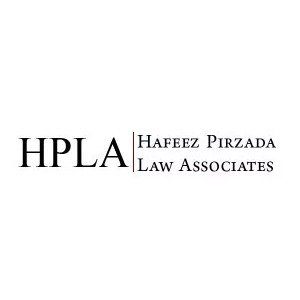Best Water Law Lawyers in Pakistan
Share your needs with us, get contacted by law firms.
Free. Takes 2 min.
Or refine your search by selecting a city:
List of the best lawyers in Pakistan
About Water Law in Pakistan
Water law in Pakistan governs the ownership, use, management, and regulation of water resources. As a country with agriculture as a major economic sector and increasing urban demands, water issues are deeply intertwined with land rights, environmental protection, and inter-provincial relations. Water law in Pakistan is shaped by a combination of Constitution provisions, federal and provincial legislation, colonial-era regulations, and customary practices. Conflicts frequently arise due to scarcity, pollution, allocation between users, and transboundary river management, requiring an understanding of legal frameworks for resolution.
Why You May Need a Lawyer
Legal assistance in water law is critical due to the complexity of rights, regulations, and potential disputes. Common situations where individuals or organizations in Pakistan may need a water law lawyer include:
- Resolving disputes over irrigation water distribution among farmers or communities.
- Negotiating water extraction or usage rights between landowners and local authorities.
- Addressing contamination of water sources due to industrial or domestic waste.
- Representing clients in inter-provincial or inter-district water disputes.
- Obtaining permits or clearances for bore-well, tube-well, or canal connections.
- Complying with environmental regulations for commercial or agricultural water use.
- Advising on compliance with groundwater extraction restrictions.
- Assisting government bodies, NGOs, or international agencies in policy formulation.
Local Laws Overview
Water law in Pakistan is largely decentralized, split between federal and provincial powers. Some of the most relevant laws and frameworks are as follows:
- Constitution of Pakistan - Water is a shared resource, with both federal and provincial governments empowered to regulate depending on the context.
- Indus River System Authority Act, 1992 (IRSA) - Regulates water allocation among the provinces for Indus River system waters.
- Canal and Drainage Act, 1873 - A key colonial-era law still governing canals, drainage, and irrigation rights in many provinces.
- Provincial Irrigation and Drainage Authorities Acts - Each province has its own authority responsible for managing irrigation and related infrastructure.
- Punishment for Water Theft Laws - The Pakistan Penal Code and special statutes address illegal tapping or theft of water.
- Punishments for Water Pollution - Provincial Environmental Protection Acts and federal Pakistan Environmental Protection Act 1997 regulate protection from water pollution and wastage.
- Groundwater Regulation - Provincial groundwater acts and rules control drilling, extraction, and sustainable use of underground water sources.
- Water Apportionment Accord 1991 - Allocates water shares among the provinces of Pakistan.
Customary laws and local water users associations often play a role, especially in rural irrigation systems. Rapid urbanization, climate change, and population growth have made legal compliance and dispute resolution in water matters increasingly important.
Frequently Asked Questions
What are my rights to access water for agricultural use?
Water rights for agricultural purposes are usually determined by land ownership, prior usage, regional canal rules, and provincial regulations. You may need an official sanction or share based on government records and receivable canal water turns (warabandi).
Can I drill a personal bore-well on my property?
In many areas, you must obtain a permit from provincial groundwater authorities or relevant agencies before drilling a bore-well for personal, agricultural, or commercial use. Unauthorized drilling may result in penalties.
Who handles disputes over canal water distribution?
Disputes are first handled by local irrigation authorities or water users associations. If unresolved, cases can be taken to provincial irrigation departments or, in serious cases, to special water courts or regular civil courts.
Is it legal to divert river water for private use?
Diverting river water without proper authorization is illegal. Approvals are needed from relevant irrigation or canal authorities to ensure equitable and lawful distribution.
How is water theft prosecuted in Pakistan?
Water theft, such as illegal canal tapping or unpermitted extraction, can lead to criminal penalties, fines, water disconnection, and civil liability under relevant statutes and local ordinances.
How does the government regulate water pollution?
Federal and provincial environmental protection agencies enforce laws against water pollution by industries, communities, and individuals. Violations can result in fines, corrective orders, or even shut-downs.
What is the role of IRSA?
The Indus River System Authority (IRSA) is responsible for allocating water from the Indus River system to the provinces in accordance with the Water Apportionment Accord 1991. It monitors flows, resolves inter-provincial disputes, and ensures fair distribution.
Can I sell my irrigation water rights?
Water rights are typically attached to land and are not freely transferable unless provincial laws or canal acts provide otherwise. In some areas, temporary sharing arrangements are allowed with official consent.
Do industries need special permission to use large amounts of water?
Yes, industries must obtain permits from relevant authorities for large-scale water use, and must comply with regulations aimed at preventing wastage and pollution.
How are inter-provincial water disputes resolved?
Such disputes are addressed first through IRSA, then escalated to the Council of Common Interests or the Supreme Court if unresolved, in accordance with the Constitution.
Additional Resources
Individuals and organizations can access the following resources for assistance and information on water law matters in Pakistan:
- Provincial Irrigation Departments (Punjab, Sindh, Khyber Pakhtunkhwa, Balochistan)
- Indus River System Authority (IRSA)
- Pakistan Council of Research in Water Resources (PCRWR)
- Environmental Protection Agencies (Federal and Provincial)
- Pakistan Water and Power Development Authority (WAPDA)
- Local Bar Associations for referral to water law specialists
- NGOs such as the Hisaar Foundation and Pakistan Water Partnership
- Academic centers at universities with expertise in water policy and law
Next Steps
If you are facing a legal issue related to water rights, water usage, disputes, or regulatory compliance, consider the following steps:
- Gather all relevant documents such as land records, permits, official correspondence, and any prior agreements.
- Contact the relevant government department or association to clarify your issue or seek basic guidance.
- Consult a qualified lawyer specializing in water law to evaluate your case and safeguard your interests.
- Be prepared to initiate formal dispute resolution or litigation if necessary, following your lawyer’s advice.
- Stay informed of your rights and obligations under both statutory and customary water laws in your area.
Early legal intervention is essential in water law disputes due to the complexity and potential economic and social impacts. A lawyer will help you navigate regulations, represent you before authorities, and protect your interests at every stage.
Lawzana helps you find the best lawyers and law firms in Pakistan through a curated and pre-screened list of qualified legal professionals. Our platform offers rankings and detailed profiles of attorneys and law firms, allowing you to compare based on practice areas, including Water Law, experience, and client feedback.
Each profile includes a description of the firm's areas of practice, client reviews, team members and partners, year of establishment, spoken languages, office locations, contact information, social media presence, and any published articles or resources. Most firms on our platform speak English and are experienced in both local and international legal matters.
Get a quote from top-rated law firms in Pakistan — quickly, securely, and without unnecessary hassle.
Disclaimer:
The information provided on this page is for general informational purposes only and does not constitute legal advice. While we strive to ensure the accuracy and relevance of the content, legal information may change over time, and interpretations of the law can vary. You should always consult with a qualified legal professional for advice specific to your situation.
We disclaim all liability for actions taken or not taken based on the content of this page. If you believe any information is incorrect or outdated, please contact us, and we will review and update it where appropriate.
Browse water law law firms by city in Pakistan
Refine your search by selecting a city.

















